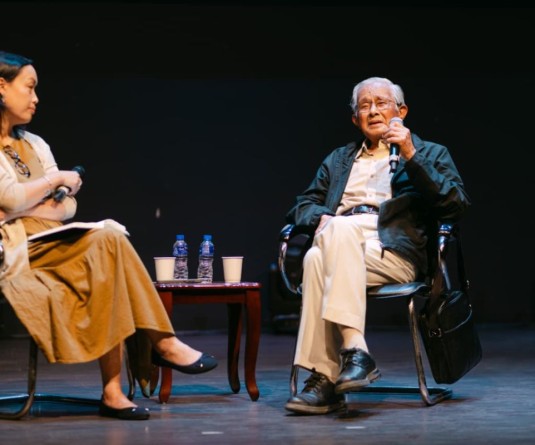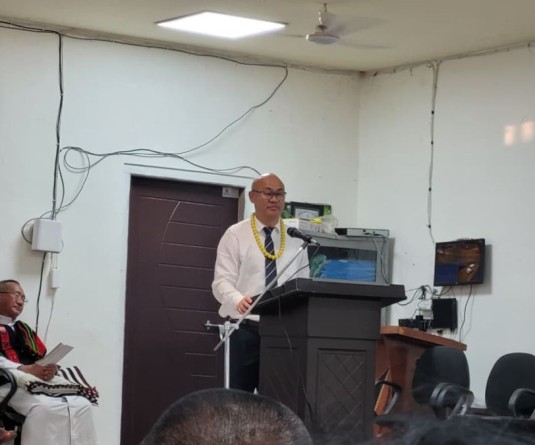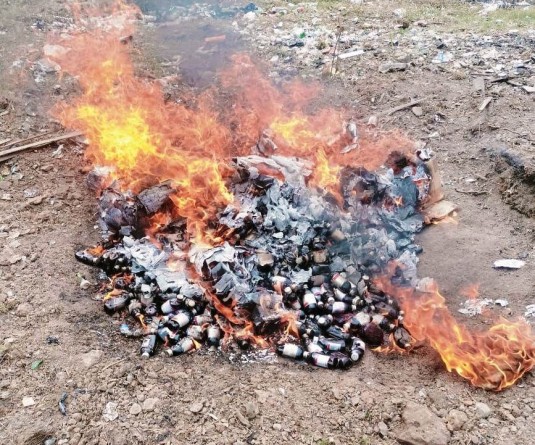
VC, Assam Agriculture University, Dr. KM Bajur Baruah is seen addressing the 6th Foundation day celebration of CIH, Medziphema cum ‘Farmers Training on Organic Farming in Horticultural Crops’ at the SASRD Auditorium, Medziphema on Sunday, March 27. (Morung Photo)
DIMAPUR, MARCH 27 (MExN): The Central Institute of Horticulture (CIH), Medziphema, coinciding with its 6th Foundation Day organised a “Farmers Training on Organic Farming in Horticultural Crops”, Sunday, March 27. Vice Chancellor of the Assam Agriculture University, Dr. KM Bajur Baruah graced the occasion as the chief guest while Commissioner & Secretary, Animal Husbandry & Sericulture, Thangi Mannen was the guest of honour.
Dr. Baruah addressing the gathering asserted that now is the time to go into or rather take up the organic mode of farming taking into account the global demand for organically grown food crops. He surmised that resorting to organic farming may decrease the quantity of production while on the brighter side it lessens the burden of input costs on the farmers. However, he put in a word of caution stating that before going organic: “We’ve to know how to source the organic planting material.” The concept of sourcing or using quality planting material have been making the rounds for decades, he said, yet India and in particularly the north east have not made any noteworthy progress in this aspect.
Today the organic farming sector is valued at $ five billion and growing, he added. To take up the challenge of conquering the market demand, he stressed on developing skills wherein, an institute such as the CIH will play a crucial role via capacity building through imparting of training to the farmers. “Knowledge is there but there is a lack of skills,” he remarked.
Save Assam, which has two worthwhile industries – tea and oil – he said that the rest of the states in the north east do not have any industry to boast of. Nevertheless, these states are rich in bio-resources which can be judiciously harvested, he opined.
Thangi Mannen lauding the contribution Dr. Akali Sema, Director of CIH towards the growth of the institution over the past six years said that it still has to realize its full capacity as a central university. Recalling the day the foundation stone of CIH was laid; Mannen said it has grown from scratch to what it is today. The then Union Agriculture Minister Sharad Pawar had laid the foundation stone. CIH has a lot to achieve, the road to which is a daunting task, nevertheless, she held.
Mannen further urged the farmers present at the occasion to update on their knowledge and keeping up with the times. “Organic farming is not so easy… it is very stingy,” she remarked while urging the farmers to be serious at what they have taken up. Alongwith the farming technology and sourcing of planting material, Mannen added that post-harvest and water resource management should also be seriously looked into. These are the aspects where the CIH should guide the farmers backed by its scientific and technical knowhow, she held. “Organic farming is hardwork yet will also provide a good price for the efforts you put in… be sincere…”
Dr. Baruah addressing the gathering asserted that now is the time to go into or rather take up the organic mode of farming taking into account the global demand for organically grown food crops. He surmised that resorting to organic farming may decrease the quantity of production while on the brighter side it lessens the burden of input costs on the farmers. However, he put in a word of caution stating that before going organic: “We’ve to know how to source the organic planting material.” The concept of sourcing or using quality planting material have been making the rounds for decades, he said, yet India and in particularly the north east have not made any noteworthy progress in this aspect.
Today the organic farming sector is valued at $ five billion and growing, he added. To take up the challenge of conquering the market demand, he stressed on developing skills wherein, an institute such as the CIH will play a crucial role via capacity building through imparting of training to the farmers. “Knowledge is there but there is a lack of skills,” he remarked.
Save Assam, which has two worthwhile industries – tea and oil – he said that the rest of the states in the north east do not have any industry to boast of. Nevertheless, these states are rich in bio-resources which can be judiciously harvested, he opined.
Thangi Mannen lauding the contribution Dr. Akali Sema, Director of CIH towards the growth of the institution over the past six years said that it still has to realize its full capacity as a central university. Recalling the day the foundation stone of CIH was laid; Mannen said it has grown from scratch to what it is today. The then Union Agriculture Minister Sharad Pawar had laid the foundation stone. CIH has a lot to achieve, the road to which is a daunting task, nevertheless, she held.
Mannen further urged the farmers present at the occasion to update on their knowledge and keeping up with the times. “Organic farming is not so easy… it is very stingy,” she remarked while urging the farmers to be serious at what they have taken up. Alongwith the farming technology and sourcing of planting material, Mannen added that post-harvest and water resource management should also be seriously looked into. These are the aspects where the CIH should guide the farmers backed by its scientific and technical knowhow, she held. “Organic farming is hardwork yet will also provide a good price for the efforts you put in… be sincere…”






